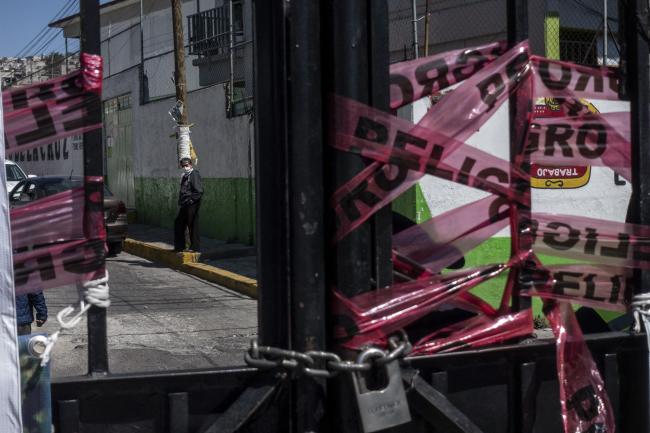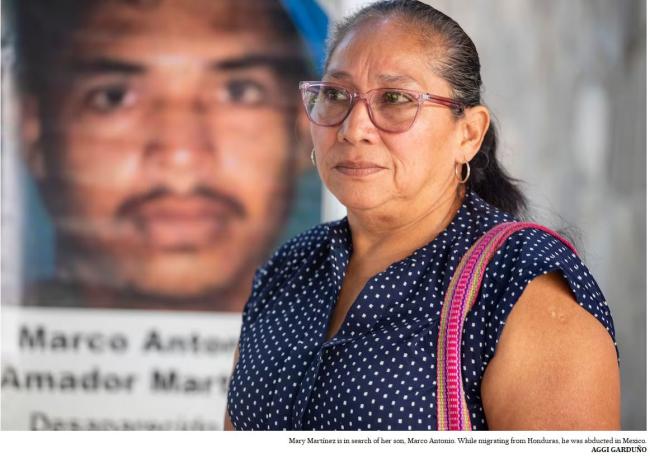Families of the missing and forensic citizenship

By Simon Robins
ICRC/CTA Missing Persons Centre
The Red Cross/Red Crescent Global Response website’s “Current Research” section contains a review of important articles on topics relating to missing persons and their families, separated families and the deceased. The articles are curated by Simon Robins, research adviser to the RCRC Missing Persons Centre and other subject experts. The aim of these articles is to allow readers to explore a particular issue in depth and develop a deeper understanding of key topics.
In this first review, we look at recent works by Robin Reineke, a forensic anthropologist who works with families of migrants who went missing or died along the US-Mexico border, together with Ernesto Schwartz-Marin and Arely Cruz-Santiago, UK-based researchers looking into exhumations in Mexico and Colombia.
The participation of families of the missing in processes to determine the fate and whereabouts of their loved ones has long been both a demand made of states and a motivation for family action.
Recent research has highlighted how families can take such participation into their own hands, even in areas like forensics, which, up to now, have primarily been considered the domain of the state.
Robin Reineke, a forensic anthropologist and co-founder of the Colibrí Center, who works with families of migrants who went missing or died along the US-Mexico border, and deals with human remains found at the border, calls this engagement “forensic citizenship”. She argues that families of missing migrants have had an impact on forensic procedures along the US-Mexico border, by learning forensic skills and developing relationships with state forensic authorities. In fact, the demands of families of the missing – such as Argentina’s Madres de la Plaza de Mayo – have long driven the use of such forensic technologies as histocompatibility testing and, subsequently, DNA testing to confirm the identity of human remains.
Families have always spearheaded the search for their missing loved ones, seeking support from others, notably state authorities – who have the primary responsibility to search for people who have gone missing and who often have exclusive access to any human remains recovered – as well as those who can act as a practical intermediary, such as the International Red Cross and Red Crescent Movement.
With regard to migrants who go missing along the US-Mexico border, families seeking information about loved ones find themselves having to deal with a bewildering array of state agencies in the US. In many cases, families are refused information by the authorities responsible, with some reporting having felt ignored and disrespected by the US authorities. In the face of such administrative obstacles, families have engaged in forensic work themselves – for example, by collecting mobile-phone records, photographs or video footage taken by survivors; interviewing witnesses; searching online databases; using the science and technology of DNA; and conducting searches in the desert for human remains. As one such family member told Reineke: “I learned that there was no official help for an illegal immigrant gone missing in a foreign country unless she was declared dead. So, we investigated ourselves.” Reineke also tells of a mother who identified her own needlework on a pair of trousers found on a body, thus enabling the identification of her son via a DNA test.
Forensic civism: towards citizen-led exhumation
Ernesto Schwartz-Marin and Arely Cruz-Santiago, in a piece entitled “Forensic civism: articulating science, DNA and kinship in contemporary Mexico and Colombia”, explored a similar area, noting how citizen-led exhumation projects are becoming more common and “disappearance … has become a generative space for those relatives who create new forms of civism around forensic knowledge”. This “forensic civism” is being driven by an epidemic of missing persons in Mexico, linked to the violence of drug cartels as well as migration. While Mexico has established a highly commendable legislative and institutional approach to the missing, the state's capacity in practice remains limited in many ways. Unidentified remains are a particular issue, with more than 15,000 currently awaiting identification in forensic-science institutions. As the bodies of the missing pile up in morgues, mass graves and clandestine cemeteries, the families of the missing – spurred on by the solidarity and action of other families – are collecting evidence themselves. This includes approaching drug cartels for information, investigating potential sites of mass graves and digging for bodies. Their efforts have now been formalized, with the organization of the first citizen-led exhumations by families supported by forensic experts and the development of an independent forensic DNA database in Mexico, created and managed by relatives of the missing.
At the heart of this type of engagement is a process of empowerment, whereby the families take the search into their own hands. Reineke describes it as a form of citizenship in which the families of the missing get directly involved in forensics – a set of practices that is, nevertheless, the responsibility of the state. The work of these families is both personal and political: while they are searching for an individual missing loved one, they are also insisting that state forensic authorities in both the US and Mexico include the missing and the dead in the state’s social and legal duties of care. This is a form of active citizenship that builds relationships of care and obligation between families of the missing, state forensic authorities, and the missing and dead themselves. More than this, family members engaging in forensic work as a part of their search also represent a growing community of care that advocates for the rights of those who have died while crossing the US-Mexico border or who have gone missing in Mexico.
Please let us know if you have any questions or comments. Join our community to see what your peers are saying about this article. Click here.



